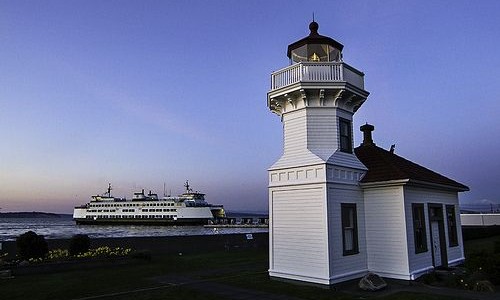By Peter Anderson, Director, Mukilteo Historical Society
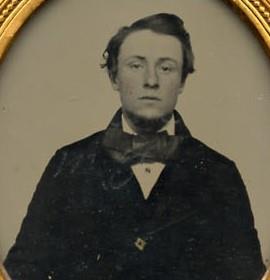
Early mail routes were served by canoe, rowboat or sailing vessel. When Snohomish County was formed separately from Island County in 1861, a post office was established at Mukilteo, along with the county seat. Mukilteo’s co-founder, Jacob D. Fowler, became the county’s first postmaster, and the post office was located in Fowler’s store/hotel on Front Street. At that time, the non-native population of the Snohomish-Tulalip-Mukilteo area was about 49 (all men), and the postage rate for domestic letters was 3 cents per ½ ounce.
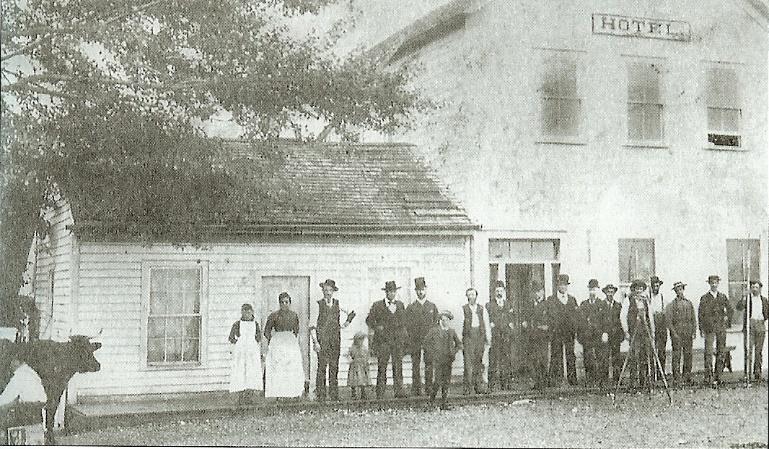
In the early years, mail came to and from Mukilteo by boat. In 1870, the S. S. Chehalis, owned and operated by Captain Wright, made trips up and down Puget Sound. The Chehalis was not intended to carry mail, but Captain Wright graciously consented to pick up the few letters waiting in Mukilteo’s post office and drop them off at the nearest point to the receiver. The boat stopped at Mukilteo on an irregular schedule about once a week at such times when there was no better cargo destined for another part of the Sound.
In 1871, the Chehalis went to a watery grave in a storm off Edmonds. Being a stern-wheeler, it had difficulty riding out the storm, so the boat was put ashore and passengers disembarked. The crew failed to make the boat fast, and sometime during the night, it floated out to deep water and sank. Captain Wright then chartered the Black Diamond for a short while to make his runs and ordered the construction of a boat to replace the Chehalis. His new boat, the “Zephyr”, was put into service in late 1871, at the same time men in Snohomish built the “Nellie”. For many years, the Zephyr and Nellie ran alternately, the Zephyr coming on Monday and returning on Tuesday, and the Nellie coming Thursday and going back Friday.
Later, mail was transported by rail. The trains carrying the mail had mail cars and clerks who worked the mail as it was picked up along the route of the train. There were “catcher pouches” for trains not scheduled for a stop. They were hung on a frame that enabled the mail clerk to extend an iron catcher and grab the pouch as the train steamed by.
Early post offices were categorized into four classes based on their gross receipts, and Mukilteo began as a fourth-class office. In early years, a fourth-class postmaster was paid solely by cancellation of stamps on letters and packages mailed exclusively at his or her post office. They had to record every letter, package or paper mailed. It was a tedious and frustrating job, especially during the Christmas season when one was rushed. If you forgot to write it down in your ledger, you suffered salary-wise, and the salary was very meager.
The Pendleton Act of March 3, 1883, established the following salary for post offices divided into four classes based on their gross receipts:
| CLASS | GROSS RECEIPTS | POSTMASTER SALARY |
|---|---|---|
| First | $40,000 or more | $3,000 – $6,000 |
| Second | $8,000 – $40,000 | $2,000 – $2,900 |
| Third | $1,900 – $8,000 | $1,000 – $1,900 |
| Fourth | under $1,900 | under $1,000 |
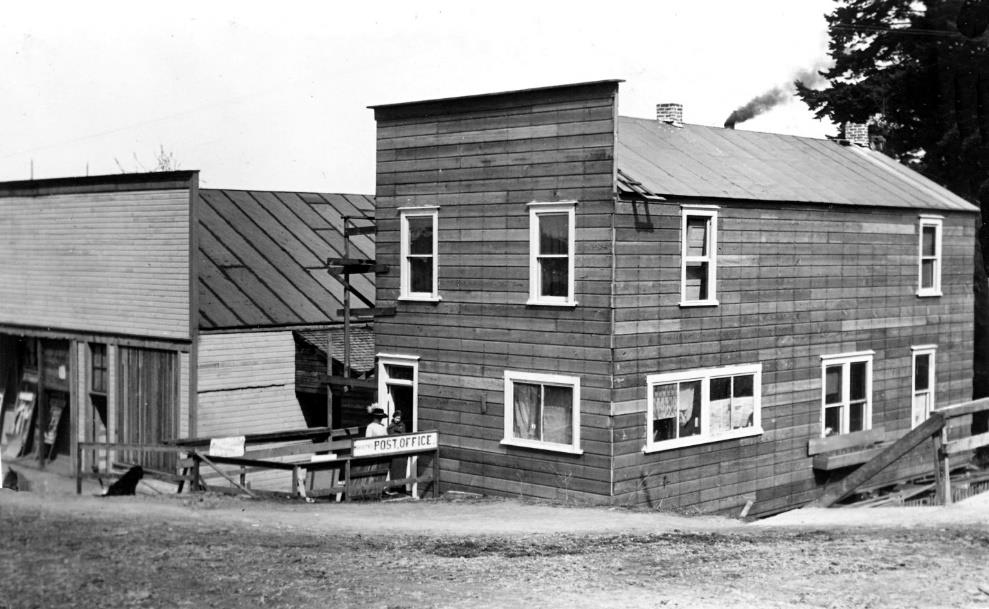
Offices were open nine to ten hours a day, six days a week. Each postmaster had to furnish the place to have the post office and provide all needed equipment such as post office boxes, safe to keep funds and stamps, plus any machines needed such as typewriter, etc. At first, the post office kept the post office box rents, and postmasters were not even allowed to count them as part of the postal receipts. This was a very sore spot among postmasters and was later changed so that box rents were included in gross receipts.
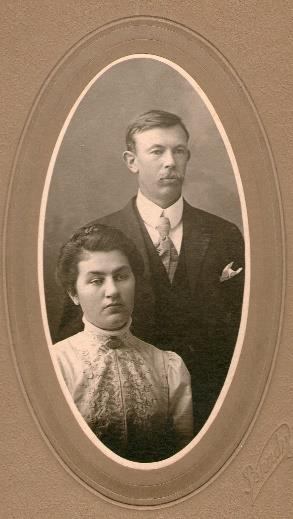
Jacob D. Fowler served as Mukilteo’s postmaster from 1861 to 1877, and again from 1881 to 1890. He died in 1892, and his daughter, Louisa Fowler Sinclair served as postmaster from 1898 to 1912. Helen Hadenfeldt was appointed postmaster in 1912. Helen and Henry Hadenfeldt built Mukilteo’s second post office on Park Avenue next to the theater they also owned. They lived on the second floor of the post office, and Helen served as postmaster from 1912 to 1934. Laura Gear, who worked for the post office, would collect the mail from the railway depot and push it up Park Avenue in a wooden wheelbarrow to the post office. There the mail was separated for delivery or pick up.
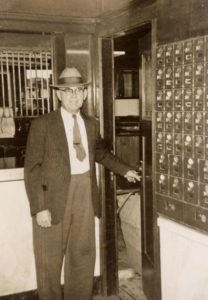
When David E. Burklund became Mukilteo postmaster in 1934, he contracted to have the third post office built at 724 Second Street. The 1,186 square-foot building featured a case in the front that held official documents, including “wanted” posters. Under Burklund’s leadership, Mukilteo was upgraded to a third-class post office in 1942. Burklund served as postmaster at this office for over 20 years until he retired, and Mayme C. Ross became acting postmaster in 1955. The post office continued with Ross as postmaster at this location until a new building was constructed at the corner of Third and Loveland in 1962. The vacated post office, at 724 Second Street, became the Mukilteo Library in 1963. The building is still standing next to Arnie’s Restaurant and has gone through several ownership and occupant changes since the library moved to larger quarters in 1978. The building was expanded with additions in 2002 and 2012.
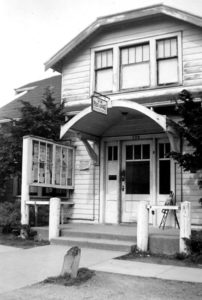
Mukilteo’s fourth post office opened in 1962 at the corner of Third Street and Loveland Avenue, next to the Presbyterian Church. The dedication ceremonies featured opening remarks by postmaster Mayme C. Ross, mayoral greetings from Dick Taylor and a short history of the Mukilteo post office by David Burklund. Mukilteo’s first mayor, Alfred E. Tunem, served as master of ceremonies. The postage rate for domestic letters at the time was five cents per ounce. The rate increased by two to four cents every few years until it reached 29 cents in 1991, when the post office moved to its current location on the Speedway.
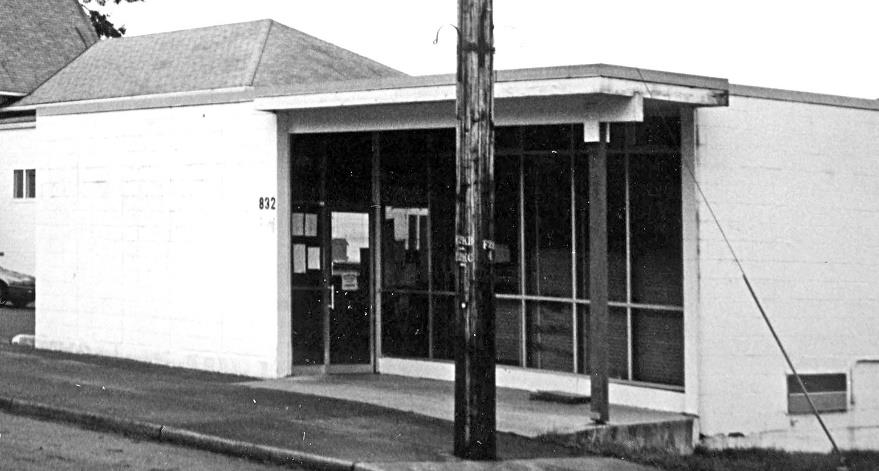
The old post office building at 832 Third Street is still standing. After the post office moved out, the 760 square-foot concrete block structure was used for a time by the Presbyterian Church for a food bank. The church sold the property in late 2004, and it is now a private single-family residence.
Mukilteo’s post office now occupies a 5,000 square-foot building at 8050 Mukilteo Speedway. Dedication ceremonies for this location took place in 1991. The current postmaster is Tim Laurence, who was appointed in April 2015. Originally from Columbus, Ohio, Laurence has worked in several post office locations around the country. He brings a 35-year career with the post office to Mukilteo, and takes pride in the friendly customer service that his staff of three clerks provides. He notes that some customers come from Everett because of this.
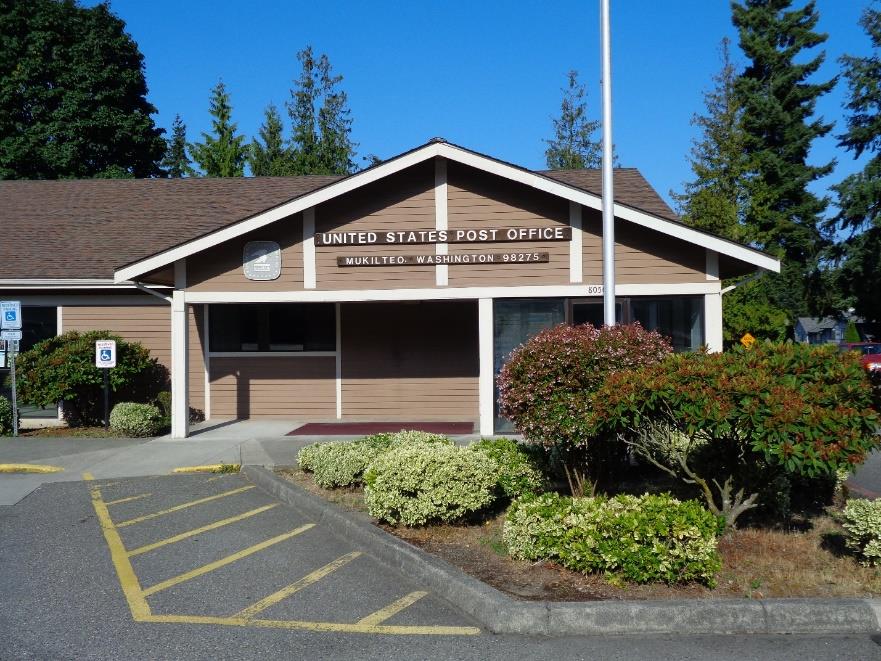
The Post Office Department now categorizes individual offices in various levels, numbered from 18 to 25, based on revenue. Mukilteo is a Level 18 office, with an annual revenue of about $800,000. The retail counter is open 8:30 am to 5:00 pm, Monday through Friday. It is closed on Saturday and Sunday, although the lobby to access post office boxes and self-service equipment is open 24/7. There are about 1200 post office boxes currently in use at Mukilteo.
Laurence noted the most common misconception about post office operations is probably that they are funded by tax dollars. They are not. Operations are entirely funded by post office revenues. Postmaster Laurence and his staff invite you to stop by and avail yourselves of some friendly service!
Originally published in the 9/4/2019 issue of the Mukilteo Beacon.
